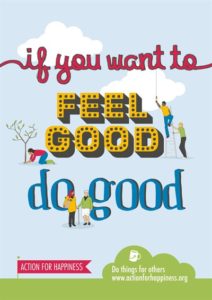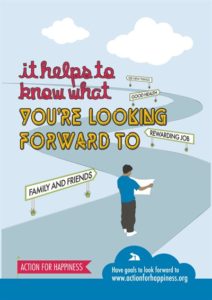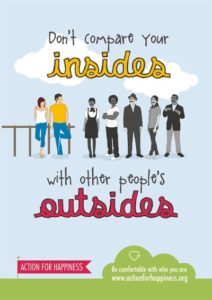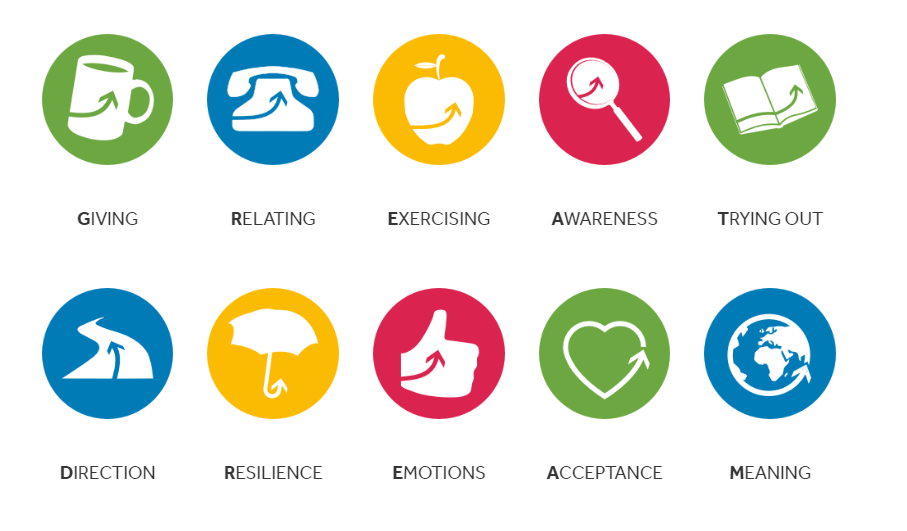Time flies and it’s already 20th March. And that means we are not only welcoming a new season and celebrating spring equinox; today is also the International Day of Happiness.

On an equinox, day and night are of equal length. It’s the perfect time to think about balance in your life.
Spring is also filled with new beginnings and the perfect time to set some intentions.
When if not on today’s Happiness Day, is the perfect time to ask yourself, what really makes you happy?
Advertisers tell us that happiness comes from buying their products. Celebrities and the media pretend it comes with beauty & fame. And politicians claim that nothing matters more than growing the economy. But what does the latest research show?
The Action for Happiness movement defines ten keys to happier living.
They are based on an extensive review of the latest findings from the science of wellbeing. They are all areas which research shows tend to make a big difference to our happiness and are within our control. Everyone’s path to happiness is different, but the evidence suggests these Ten Keys consistently tend to have a positive impact on people’s happiness and well-being.
The first five keys (GREAT – Giving, Relating, Excercising, Awareness, Trying out) are about how we interact with the outside world in our daily activities. They are based on the Five Ways to Wellbeing developed by nef as part of the Foresight Project.
1. GIVING
“If you want others to be happy, practice compassion. If you want to be happy, practice compassion.” This quote by His Holiness the Dalai Lama shows that helping others and caring about them is not only good for them, it also makes us happier, too.
2. RELATING
Strong and close relationships with family and friends are fundamental to our happiness.
3. EXERCISING
There are many reasons, why exercising makes us happier and boosts our well-being:
Dopamine, a neurotransmitter in the brain that’s necessary for feeling pleasure and happiness, is released during exercise. Working out makes us less stressed out. It gives us more energy. It helps fight insomnia and improves the immune system. It even eases anxiety and can reduce/preventing depression.
So there you have it. No more excuses. Even a five minute walk outside or a 15 minute Asana practice you will feel the benefits.
4. AWARENESS
Awareness or mindfulness is commonly defined as “the state of being attentive to and aware of what is taking place in the present”. It sounds simple, yet mindfulness is something that, in today’s busy, multi-tasking-world, few of us do naturally. For most of us it can feel hard and has to be trained.
As numerous studies show the benefits of mindfulness in many aspects of our lives, learning to be more mindful and aware is worth the effort.
5. TRYING OUT
You’ve probably seen challenges like “do something new every day for 30 days” on the internet. It doesn’t have to be wild stuff like Bungee Jumping or Heli Skiing, when oyu think about it, you will discover thousands of things, you have never done before. Try a new recipe, go for a new Yoga pose (maybe one you’ve avoided so far), listen to an artist you don’t know, take another route to work or back home, learn a foreign word…
Trying out new things, gives us a sense of accomplishment and helps boost our self-confidence and resilience.
The second five keys (DREAM – Direction, Resilience, Emotions, Acceptance, Meaning) come from inside us and depend on our attitude to life:
6. DIRECTION
Choosing ambitious but realistic goals gives our lives direction and brings a sense of accomplishment and satisfaction when we achieve them.
7. RESILIENCE
Resilience… It’s one of my favorite English words. I love the sound of it and also its meaning. Resilience comes from the Latin word resilio – to jump back- and is increasingly used in everyday language to describe our ability to cope with and bounce back from adversity. Although, resilience is not always easy, it’s a skill that can be learned.
We can’t always predict or control what life throws at us, but we can build a range of skills and nurture our resources to help us respond flexibly, effectively deal with challenges, recover more quickly and even learn and grow as a result.
Remember, if you can’t change it, change the way you think about it.
8. EMOTIONS
With a positive attitude we experience pleasant and happy feelings. Similar as negative thoughts, words and attitude, create negative and unhappy feelings, moods and behavior.
Negative thoughts drain you of energy and keep you from being in the present moment (see 4. Awareness).
Consider positive thinking as a way of life. This is another thing, you can actually train and learn. Simply start with smiling more often. Sing, meditate, read positive quotes, surround yourself with positive people…
Of course, we have to be realistic about life’s ups and downs. But it’s on us, to focus on the good aspects of any situation.
9. ACCEPTANCE
No-one’s perfect. We are not perfect and that is good. In fact, we don’t have to be perfect. But so often we compare our insides to other people’s outsides. Comparing ourselves and having constant criticism in our heads about not being good enough is a sure way to be unhappy. We need to stop being so hard and start being more compassionate toward ourselves instead.
10. MEANING
Finding purpose in life is something very individual. It might be a religious faith, being a parent or doing a job that makes a difference. The answers vary for each of us but they all involve being connected to something bigger than ourselves.
Start to think about the point of being here and what is really important. It’s never too soon (or too late) to start putting the really important things first.
About the Ten Keys:
The Ten Keys to Happier Living framework was jointly developed by Vanessa King and the Action for Happiness team in 2010, based on an extensive review of the latest research evidence relating to psychological/mental wellbeing.




